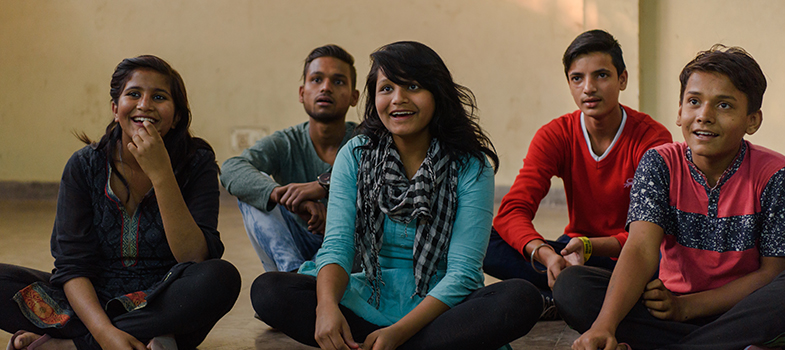4.2 Different words for different contexts
The next two activities are for you to do on your own, to help you prepare to lead sessions on pleasure and anatomy. It will help you to reflect on which words for sexual organs you feel more and less comfortable using, and aims to make it easier for you to use appropriate terminology within your CSE sessions.
Activity 4.2: Which words do you use?
Look at the words you have written in the box above and ask yourself these questions:
- Which words have positive or negative associations for you?
- Can you see any differences between the genders, for example, do you know as many different words for the vagina as for the penis?
- Are there any words that could be seen as offensive – why? Could you use the same words but with new associations? If so, what would these be?
- What words do you feel comfortable using in the following settings?
- a.when talking to your friends?
- b.when talking to different family members?
- c.when talking to a young child?
- d.when talking to a doctor?
- e.when talking to a sexual partner?
- f.in your CSE class?
Discussion
Here are the words that one member of the writing team, working in English, thought of. They are just their personal responses, your answers will probably be different – there are no right or wrong answers in this exercise.
Penis, vagina, vulva, clitoris, testicles, dick, cock, balls, fanny, crown jewels, trouser snake, willy
And here are the answers they gave to the questions:
- Positive associations: cock, clitoris. Negative associations: fanny, dick, trouser snake, crown jewels
- I know many more words for the male sexual organs than female
- Some people think cock is offensive and it is sometimes used as an insult but I like it as a word so I’ve given it new positive associations.
-
- a.To my friends I’m not sure! Possibly the ‘correct’ ones like penis, vagina, vulva, etc. Or, if it was a good friend I might say cock.
- b.For different family members definitely the ‘correct’ ones!
- c.To a young child definitely willy and probably vulva
- d.To my doctor, obviously the more medical ones
- e.To my sexual partner the ones we both like
- f.In a CSE class I’d include the ‘correct’ ones, but I might also say willy and balls to use more everyday language. I might say fanny as well, even though I don’t like it much, but it could be useful as a less offensive slang term.
We often think of terms for the sexual organs as either ‘correct’ or ‘rude’ but it’s more helpful to think of all the different terms as a resource – a bit like a toolbox where you choose which tool is best for a particular communication.
In a CSE session, it’s important that you are direct and specific and use language which is familiar to young people as well as more scientific terms. The young people in your sessions may use different terms than those you are used to, and they need to be able to express themselves comfortably in the classroom setting, without worrying about being offensive to you or to each other.
Remember that not everyone will have the same sensibilities when it comes to language, and talking about sexual matters requires sensitivity to the feelings of others. So any terms you feel may be questionable should be discussed in an open and honest way.
Rather than telling young people a term is ‘wrong’, open it up in class for discussion. You might all learn something!
The next activity is very quick, but is worth spending a few minutes on, to help you get more comfortable with talking about the genitals. This is an activity for you to do before your CSE sessions.
Activity 4.3: Saying the words
Say all the words in your toolbox out loud. Were any words difficult to say out loud? Maybe you whispered some, and that’s okay. We all have different associations and emotions relating to words about sexuality. If any words were difficult, say them out loud several times, maybe in front of a mirror.
As a last step, you can practise saying them in front of a friend. Remember: it’s okay to feel embarrassed, blush or giggle, but practising like this beforehand will make it less likely that you feel embarrassed during a CSE session.
4.1 Sensitive parts of the body

